The relationship between quality of life, psychological distress and coping strategies of persons living with HIV/AIDS in Cairo, Egypt
Abstract
HIV patients face an array of social and psychological problems, such as depression, which can affect their quality of life. Moreover, HIV infection is also linked to psychological distress such as anxiety. In addition, avoidant emotion-focused strategies such as acceptance, wishful thinking and self-blame are associated with higher levels of psychological distress in persons with HIV. Current health services in the city of Cairo, Egypt, are not adapted to provide advice and psychological support to people living with HIV to aid in the development of problem-solving skills to cope with the stress of living with HIV. The purpose of this study was to examine the relationship between quality of life, psychological distress and the coping strategies of persons living with HIV/AIDS in Cairo, Egypt. A quantitative methodology with a cross-sectional correlational design was adopted in this study. Data collection entailed questionnaires that consisted of four sections: Demographics, Quality of Life Enjoyment and Satisfaction Questionnaire (Q-LES-Q), Depression, Anxiety, Stress Scales (DASS) and the Cope Inventory. The sample consisted of 202 HIV/AIDS participants who access the National AIDS Program (NAP). The data were analysed using the Statistical Program for Social Science V23 (SPSS). The results are provided using descriptive and inferential statistics. The findings of the study show that in terms of the prevalence of psychological distress, the moderate scales were stress and depression, while the severe scale was anxiety. The most prevalent of coping styles was emotion-focused coping, specifically in terms of acceptance and religion. In terms of the prevalence of quality of life, the highest scores were for family and social relationships, while the lowest scores were for sexual drive and leisure time activities. The findings also show that psychological distress and certain coping styles such as substance use negatively predicted quality of life of patients with HIV/AIDS. Positive predictors included coping styles such as venting, positive reframing, humour, acceptance and religion.

